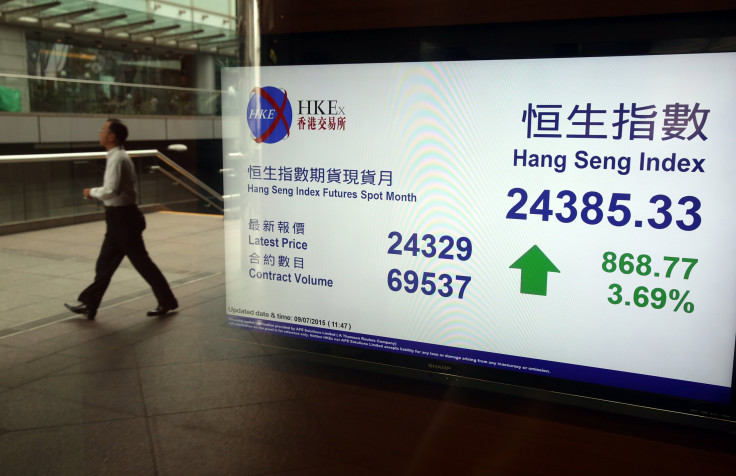China's Stock Markets Rise Again, As Police Say They've Found Signs Of Market Manipulation

SHANGHAI -- China’s stock markets continued their rebound Monday, after falling dramatically over the past month. And in a sign that some of last week’s “irrational panic,” as China’s regulator had called it, may have faded, over 300 listed Chinese companies resumed trading.
Shanghai’s main index was up a further 2.4 percent, following a combined rise of more than 10 percent on Thursday and Friday. The secondary and high-tech boards in Shenzhen, which had fallen further early last week, rebounded even more strongly, ending the day up more than 4 percent and almost 6 percent respectively. Hong Kong’s Hang Seng index, which last week saw its biggest one-day fall since the 2008 financial crisis, also continued to climb, closing 1 percent higher.
Many Chinese companies had asked for trading in their stocks to be suspended during last week’s chaos -- though about a thousand, or about a third of the market, still remained suspended on Monday. The Shanghai Composite Index briefly broke through the 4,000 mark, seen as a psychologically important symbol of a healthy market. However, it fell back slightly in late trading, as some investors sought to lock in gains as soon as possible -- a reminder that anxiety remains, with some concerns that the further resumption of trading by more companies would deflate share prices.
The recent rebound follows massive intervention in the markets by the government last week -- with billions of dollars in government funds spent on buying shares, and banks, brokerages, state firms and large investors ordered to buy or retain stocks -- and also a further tightening of rules over the weekend: The government ordered brokerages to enforce regulations requiring investors to register with their real names and identity details, and also said it would crack down on companies offering illegal loans to those borrowing money to buy stocks, which is seen as having fuelled a boom in borrowing to buy shares, leaving many investors exposed when prices began to fall.
State media said the real-name move was designed to stop individuals using accounts registered in different names to push the price of company’s shares up or down. And Chinese media on Monday headlined official reports that police had found evidence of illegal manipulation of the market by brokerages, including “malicious short-selling," insider trading and collusion designed to induce panic-selling -- though some observers said these allegations did not seem convincing, and may have been designed to distract public attention away from flaws in the market and in official regulation. A commentator in the official Global Times, meanwhile, said manipulation of the market did occur, and there should be more regular investigations into such practices – but added that “we should not use conspiracy theories to explain stock market slumps.”
Chinese authorities have come in for some criticism for not dampening market sentiment, which saw tens of millions of investors surge into the market over the past few months, many buying shares for the first time and apparently with little awareness of the potential risk. Even though China's stock market is now some 25 percent below its peak of a month ago, it remains at double its level of a year ago, despite a recent slowdown in the domestic economy -- and several experts have said it remains overvalued, with the price-to-earnings ratio of many companies on the Chinese markets far higher than the average for listed companies in Western markets.
China did however see an unexpected rise in exports in June, according to figures just released -- up by 2.8 percent on the previous year -- and a slower-than-expected fall in imports. And Chinese officials have said over the past week that the economy is “over the worst.” (Full economic figures for the first half of the year are expected later this week.)
China’s economy grew by 7 percent in the first quarter of 2015, its slowest rate in six years, and some economists have said it may struggle to maintain that level in the second quarter. The government has taken a series of steps including cutting interest rates to help boost lending and economic growth. But concerns have been expressed that the stock market volatility could hit other economic sectors including real estate and consumer spending.
Stephen Roach, former chairman of Morgan Stanley Asia, wrote on Monday that China’s consumer sector was still relatively “embryonic,” and that this therefore reduced the potential knock-on impact on a stock market crash on the real economy. And he said the authorities still had “plenty of ammunition” to deal with the “carnage in the equity market.” But in an article published in the Global Times, he also warned that it was not yet clear whether the measures the government had taken so far would be enough to halt the decline -- and said the authorities needed to carefully examine what had happened on the markets over the past year, adding that "China can ill afford to make the same mistake twice.”
© Copyright IBTimes 2024. All rights reserved.






















